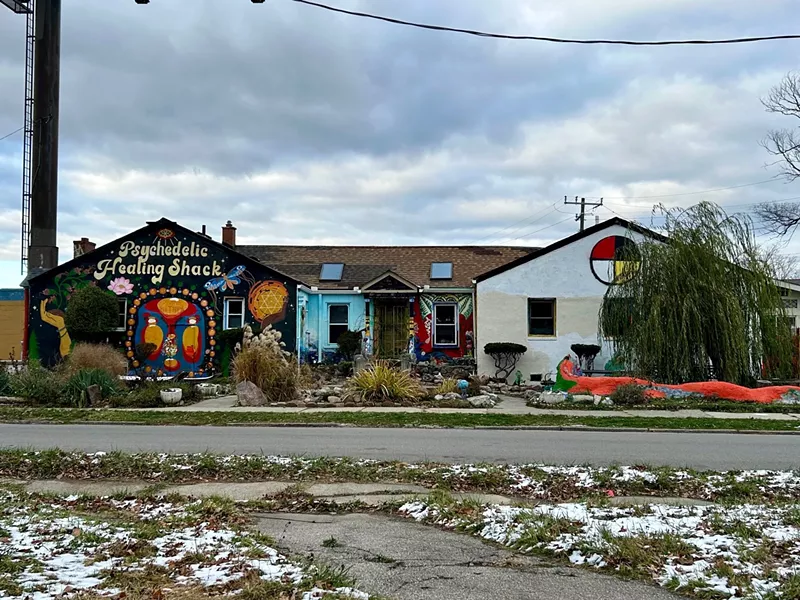
The leader of a non-denominational church that incorporates the use of cannabis and psilocybin mushrooms filed a lawsuit against the City of Detroit’s top lawyer on Tuesday, alleging defamation over statements he made to Metro Times, as well as religious discrimination and civil rights violations.
The suit comes in the wake of controversial statements made by Detroit Corporation Counsel Conrad Mallett Jr. in a Metro Times article published on Dec. 3.Reverend Heidi Grossman-Lepp, founder of Sugarleaf Church, accuses Detroit Corporation Counsel Conrad Mallett Jr. of making "malicious statements [that] were false and defamatory" when he commented on the legality of mushrooms at the Psychedelic Healing Shack.
The lawsuit, filed in Wayne County Circuit Court, seeks $4.2 million in damages and demands a court order to stop Mallett from “making further defamatory or discriminatory statements” about the church or its members.
The controversy stems from a September raid on the Psychedelic Healing Shack, a longtime Detroit fixture along Woodward Avenue.
Detroit police allege owner Robert Pizzimenti, better known as Dr. Bob, sold mushrooms to an undercover cop on Sept. 11. A day later, police with guns drawn raided the building and allegedly seized 99 grams of psilocybin mushrooms and 10 grams of marijuana
No charges were filed against Pizzimenti, but the city forced the business to close and demanded he sign a consent agreement to avoid permanent closure.
Under the agreement, which Pizzimenti says he won’t sign, the city can conduct random, unscheduled inspections of the Psychedelic Healing Shack. It would also require Pizzimenti to admit to illegal sales of marijuana and psilocybin, prevent him from filing a lawsuit against the city for the raid or closure, and threaten permanent revocation of his business license if he continues selling the plants.
After the seizure, the Psychedelic Healing Shack became a branch of Sugarleaf Church, which Pizzimenti and Grossman-Lepp contend provides legal grounds for the spiritual use of mushrooms under the First Amendment’s guarantee of religious freedom.
In the Dec. 3 Metro Times article, Mallett dismissed such claims, arguing, “It is against the law to sell marijuana without a license. It is against the law to sell psychedelic mushrooms. Like others before him, Mr. Pizzimenti is trying to hide behind the church and mask his criminal behavior. The City of Detroit has confronted others making similar claims. In each case the city of Detroit was able to prove behavior was illegal. If Mr. Pizzimenti persists, he will be prosecuted to the full extent of the law.”
Grossman-Lepp’s lawsuit argues that Mallett’s comments were defamatory and amounted to a targeted attack on Sugarleaf Church, which she founded in 2014 to incorporate entheogenic sacraments, including cannabis and psilocybin mushrooms, as part of its spiritual practices. She alleges that Mallett’s statements have caused emotional distress and created a chilling effect on the church’s religious activities.
The city’s actions “were undertaken with the intent to intimidate and suppress Plaintiff’s lawful religious practice,” the lawsuit states, citing violations of equal protection, civil rights under the color of law, and protections against double jeopardy. Grossman-Lepp further alleges that Mallett threatened her and her church members with prosecution “for matters already resolved through legal processes.”
Grossman-Lepp is no stranger to legal battles over her religious practices. In 2017, she faced felony charges for marijuana cultivation and conspiracy, stemming from law-enforcement raids on multiple properties associated with her church in California. Authorities seized more than 1,500 cannabis plants and other assets. After a jury deadlocked in 2019, prosecutors dropped the charges. Grossman-Lepp has since defended 27 criminal cases involving church members by citing the Religious Freedom Restoration Act, which prohibits the government from substantially burdening a person’s exercise of religion without compelling justification.
The lawsuit also highlights what it describes as a pattern of harassment by Detroit and other municipalities, including Hazel Park. Grossman-Lepp says local police have raided several spiritual centers using entheogenic sacraments, despite the decriminalization of psilocybin in Detroit and Hazel Park. She characterizes the raids as “selective enforcement” that diverts attention from more pressing public-safety concerns.
“By choosing to target the Healing Shack instead of addressing real and pervasive issues like the nearby crack houses and crime, the city’s actions are not only disappointing but legally questionable,” Grossman-Lepp wrote in a letter to city officials last month. “This selective enforcement defies the public’s mandate and opens the city up to significant legal exposure by disregarding constitutionally protected religious freedoms.”
This time, Mallett declined to comment. City spokesman John Roach says Mallett has not been served with the lawsuit yet, and the city doesn’t typically comment on ongoing litigation.
The broader debate over the religious use of entheogens has intensified in Detroit, where Sugarleaf Church’s lawsuit is the latest in a series of legal challenges. In September, Soul Tribes International Ministries, Detroit’s first “psychedelic church,” filed a lawsuit against the city after police raided its operations. Advocates argue that entheogenic sacraments are central to their religious practices and liken them to wine in Christian communion or peyote in Native American ceremonies.
As Grossman-Lepp prepares to open a new Sugarleaf Church location in Brush Park, she insists that the fight is about more than just her congregation.
“This is about ensuring that the government does not trample on religious freedoms,” she tells Metro Times. “We will not back down.”

